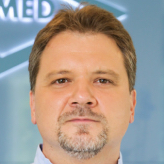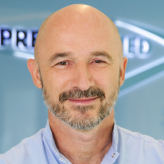TREATMENT - THYROID
THYROID SURGERY WITHOUT CUTS – RADIOFREQUENCY ABLATION OF THYROID NODULES (RFA)
Removing the thyroid nodules without open surgery is a no-cut solution. As the thyroid remains, the procedure does not mean a drastic change for the body; the puncture leaves no visible mark on the frontal neck, making the procedure gentle and aesthetically rewarding. The greatest advantage of this innovative, state-of-the-art procedure is that it minimizes risks and you do not need to go under anaesthesia. You can spend the short convalescent period in a most comfortable environment and due to the fast recovery, you can resume your normal life very soon, and the post-operative care thorough and free of charge.
HOW IS RADIOFREQUENCY ABLATION (RFA) PERFORMED?
The RFA treatment takes place in a designated room of Premier Med Healthcare, Training and Research Institute. The procedure is performed by a team of expert specialists: an expert interventional radiologist, an anaesthesiologist and an interventional radiology assistant. Before the procedure, in the relaxation room the assistant will ask you to change into the treatment clothing, then you will be asked to lie on the examination table; the radiologist will plan the most appropriate posture for the procedure and will decide which is the safest point of introduction in your case. The procedure is performed under sterile conditions. Local anaesthetic will be applied on your skin above the puncture. The surface of the thyroid will also be anesthetized. Then the physician introduces the fine needle into the desired area, then warms it up and the heat will destroy the cells of the thyroid nodule. During the procedure you are not likely too feel any pain.
DETAILED INFORMATION ABOUT THE PROCEDURE
This information below aims to give you an overview of the RFA procedure, to provide answers for some of your questions and serves as a point of departure when you discuss the treatment with your physician. The information below is not in lieu of medical advice provided by your physician. It may, however, help you ask questions in connection with the procedure. We do our best to give you an exhaustive overview during the consultation, but we always have time allocated to answering any further questions you may have, so we can clarify on any issues you may have about the procedure: we are Your team.
WHAT HAPPENS AFTER THE PROCEDURE?
A small bandage will be placed over the puncture, and the surgery site will be cooled. After this you will be transported into the relaxation room, where you will be monitored for 2-3 hours, but you may stay longer than that if you wish. We will be checking your swallow function; you will be consuming pudding and lots of liquid. While being monitored, you can relax. Your blood pressure will be measured on multiple occasions. If you do not experience any discomfort and your physician approves, you may leave the health centre after an hour of relaxation. We recommend that a family member or friend escort you home.
WHAT ARE THE ADVANTAGES OF RFA AS OPPOSED TO OPEN SURGERY?
The RFA procedure was first used in 2006 to treat problems caused by benign thyroid nodules. The procedure quickly gained popularity, as it is as efficient as open surgery, and, in addition, no scar remains on the frontal neck as a result.
Another benefit of RFA is that, as opposed to open surgeries, it does not require the patient to be anaesthetized or stay in the hospital after the procedure.
Medically speaking, the most significant advantage of RFA is the resulting fewer complications even in the case of patients with more intercurrent diseases. The treatment causes minimal inconvenience and little, if any pain, and complications occur in very small percentage of cases. During the procedure local anaesthetic is applied, and the insignificant incision (puncture) leaves no unsightly scars. Unlike after an open surgery, you need to spend only a few hours at our institute following a transcutaneous RFA treatment. Both the procedure and the recovery time is short, thus patients can quickly resume their everyday life and work.
WHAT ARE THE DANGERS OF THE RFA TREATMENT?
Radiofrequency ablation is a very safe procedure, but like any other surgery, it has possible risks. A number of studies have been written on the issue, but it can be safely said that complications may be observed in a bit over 1% of the cases only. One of these mostly insignificant complications is the pain that may occur during the procedure. This usually ceases if the treatment is suspended for a short time, and lasting pain hardly ever occurs during the procedure. Another possible complication is the temporary voice change which, however, can be avoided by applying proper treatment techniques.
Although minimal, but there is a risk of haemorrhage. A slight compression of the puncture site ends the bleeding in the majority of the cases. Haematomas that may occur at the procedure site usually disappear within one or two weeks.
Follow-up examinations are due four weeks, 3 months, 6 months and 12 months after the procedure, but at the second examination (3 months after the procedure) you do not need to make a personal appearance, you will only need to send your CBC (Complete Blood Count) results.
CONSULT WITH OUR EXPERTS SO WE CAN HELP YOU!
Choose us and minimize the waiting time for treatment. We can give you an appointment at the earliest convenience.
OUR PHYSICIANS

DR. DEÁK PÁL ÁKOS PH.D.
Interventional radiologist, radiologist, associate professor

DR. DOROS ATTILA PH.D.
Interventional radiologist, radiologist, associate professor
PRICES OF THYROID NODULE TREATMENT:
- Consultation with ultrasound examination: 40 000 Ft
- First fine needle biopsy: 70 000 Ft
- Second fine needle biopsy: 60 000 Ft
- Core biopsy: 85 000 Ft
- Radiofrequency thyroid nodule ablation: 890 000 Ft
- If more treatments are necessary – Thyroid RFA second treatment 690 000 Ft
- Thyroid ethanol sclerotherapy 85 000 Ft
- Thyroid ultrasound 125 000 Ft

